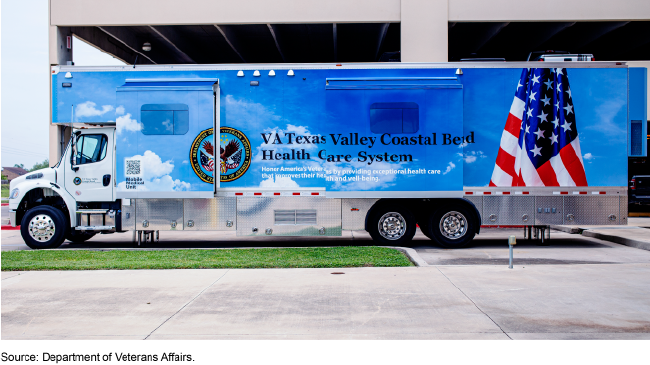VA Health Care: Opportunities to Improve Access for Veterans Living in Rural Areas
Fast Facts
About a third of the 8.3 million veterans who receive Department of Veterans Affairs health care live in rural areas. The VA has sought to improve their access to care with transportation services, mobile medical units, and more.
We testified about our prior work examining these VA efforts and its responses to our recommendations. For example, VA reported it had 52 active mobile medical units, but we found 9 either weren't mobile or weren't providing clinical services. We recommended that VA gather more complete and accurate information on these units. VA agreed and identified the steps it plans to take.
A Department of Veterans Affairs Mobile Medical Unit

Highlights
What GAO Found
Veterans living in rural areas can experience unique challenges in accessing health care. For example, GAO's past work and other research have demonstrated that long distances from health care facilities, limited access to broadband internet, and staffing shortages, among other factors, may affect access to care for this population. GAO has made several recommendations to the Department of Veterans Affairs (VA) to help ensure its efforts effectively address the access challenges veterans living in rural areas face. VA agreed with these recommendations and reported steps taken towards implementing them.
- Office of Rural Health. This office provides funding to support (1) initiatives that expand existing services for veterans living in rural areas, and (2) research on interventions intended to address disparities in health care for this population. In May 2023, GAO found that the office does not communicate its research funding opportunities across VA. GAO also found that the office had not developed performance goals that define the level of performance the office aims to achieve during a particular year. GAO made two recommendations for the office to improve communication of rural health initiatives and develop performance goals. VA concurred and, as of March 2024, has taken steps to implement them, including developing a communication plan and drafting performance goals for its upcoming strategic plan.
- Rural-focused mental health treatment programs. The Office of Rural Health makes available seed funding to two outpatient intensive mental health programs. These two programs are designed to provide intensive community mental health recovery services to veterans living in rural areas. In February 2023, GAO found the guidelines for selecting its outpatient intensive mental health care programs for seed funding do not consider where veterans with serious mental illness live. GAO recommended that VA update these guidelines to include data on the locations of veterans with serious mental illness. VA concurred with the recommendation. As of April 2024, VA has taken steps to implement it, such as developing a tool to indicate whether there are veterans within the proposed service area that have serious mental illness.
- Mobile medical units. Mobile medical units are vehicles equipped to deliver primary and specialty care to veterans—in particular, veterans living in rural areas. In its December 2023 report GAO recommended that VA assess the reliability of the data it reports on mobile medical units and include additional information in its reports to Congress about their use. VA concurred with the first recommendation and plans to initiate such a project to ensure the reliability of the data management plan for its mobile medical units by August 2025. VA concurred in principle with the second recommendation. VA reported it plans to work with Congress to understand its reporting needs and update its 2024 report accordingly.
Why GAO Did This Study
About one-third of the 8.3 million veterans enrolled in Veterans Health Administration services lived in a rural area in fiscal year 2022. Comparatively, about one-fifth of Americans lived in a rural area. VA projects rural veterans will continue to represent a significant proportion of the nation's veterans. According to VA, rural veterans experience worse health outcomes, including cardiovascular and suicide deaths, compared to veterans in urban areas.
VA identified veterans living in rural areas as an underserved population in its strategic plan and included a strategic objective to increase health care access for this population.
This statement describes GAO's recent work examining rural veterans' access to health care, including recommendations GAO made to VA on (1) the Office of Rural Health's initiatives and research; (2) funding for intensive mental health care services to rural veterans; and (3) mobile medical unit operations and performance.
This statement is based on three GAO reports issued between February and December 2023 (GAO-23-105855, GAO-23-105544, and GAO-24-106331). GAO also reviewed documents from VA related to steps the agency has taken to address the eight recommendations GAO made across these reports. VA concurred or concurred in principle with each of the eight recommendations and, as of March 2024, VA has implemented three of them.
For more information, contact Alyssa M. Hundrup at (202) 512-7114 or hundrupa@gao.gov.
